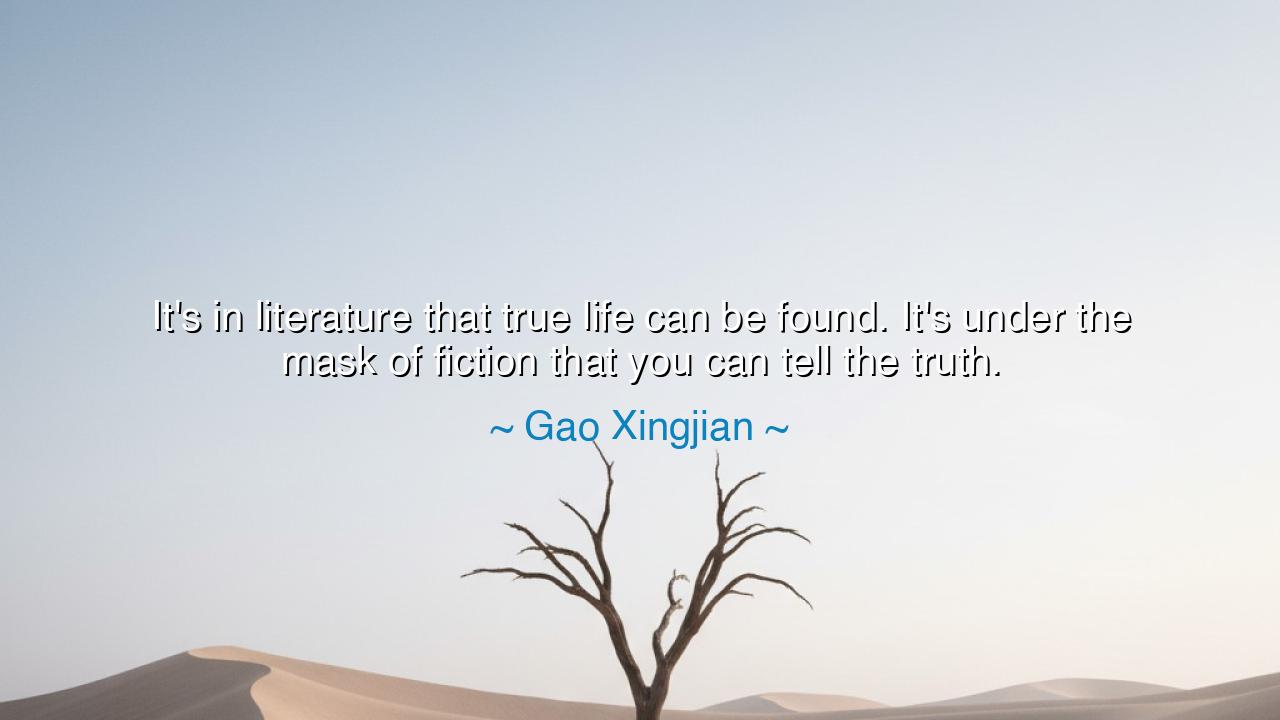
It's in literature that true life can be found. It's under the
It's in literature that true life can be found. It's under the mask of fiction that you can tell the truth.






Gao Xingjian, exile and seer, spoke with the wisdom of one who had walked through fire: “It’s in literature that true life can be found. It’s under the mask of fiction that you can tell the truth.” In these words lies a paradox as old as storytelling itself—that sometimes the veil reveals more than the naked face, that through fiction, the heart dares to whisper truths that daily speech would silence. For life in its raw form may be bound by fear, by politics, by shame, but in literature, cloaked in imagination, the soul speaks freely.
The ancients knew this mystery well. In Greece, Aesop told his fables not through men, but through animals. A fox might outwit a crow, a lion might boast of strength, and through these masks the storytellers spoke truths about pride, cunning, and folly. To say openly that a king was proud might cost a man his life, but to say it through the voice of a lion in a tale—this was safe, and yet sharper than any accusation. Thus the mask of fiction became the guardian of truth, protecting the speaker while delivering the lesson to those with ears to hear.
History offers many such examples. Consider Alexander Solzhenitsyn, who wrote of the cruelty of Soviet labor camps. Bound by censorship, he clothed his truths in the garb of story, disguising lived horror in the form of narrative. Yet all who read knew the reality, and the fiction struck harder than fact. It opened the eyes of the world. Gao himself, silenced in his homeland, found in literature the only voice that could not be bound, for story travels where speech is shackled, and fiction tells what fear would forbid.
Yet this is not only about politics or tyranny. The human heart itself often hides its truths. We are ashamed of our longing, afraid of our despair, uncertain of our hope. But when clothed in fiction, these emotions breathe. The poet may write of a wanderer, but it is his own loneliness. The novelist may write of a love doomed by fate, but it is her own longing for what was lost. In the mask of fiction, truth is not denied, but transfigured—made beautiful, bearable, and eternal.
The lesson is profound: if you wish to know true life, seek it not only in chronicles of fact, but in the stories that shape the soul. Numbers and records may tell you what happened, but stories tell you what it meant. A census of soldiers cannot tell you the cost of war, but Homer’s Iliad can. A ledger of dates cannot tell you the burden of exile, but Gao’s novels do. Through literature, the human spirit finds its purest expression.
Therefore, O seeker, do not despise fiction as falsehood. Rather, treat it as the mask that reveals. Read the poets, the novelists, the dramatists, and look beyond the veil. Ask not only, Is this real? but, What truth hides here? What wisdom is spoken through this mask? And when you yourself struggle to tell your own truth, take up the pen of story. Cloak your heart in parable, and let the world glimpse what your bare voice could never say.
Practical actions follow. Read one work of literature this month not as entertainment, but as revelation—search its characters for the truths of your own life. Write your own story, even if only for yourself, disguising your fears and hopes in the mask of narrative. Share it, if you dare, and watch how others recognize themselves in it. For in this way, literature becomes not escape, but communion—souls speaking across time, across distance, through the sacred veil of fiction.
Remember Gao Xingjian’s wisdom: true life is found in literature, because in fiction’s mask, the heart is unafraid to speak. Cherish this gift, for it is one of the oldest powers given to humanity: the ability to tell stories, to hide and reveal, to protect and proclaim. And in that eternal dance between mask and truth, the human spirit is preserved, remembered, and renewed.






AAdministratorAdministrator
Welcome, honored guests. Please leave a comment, we will respond soon